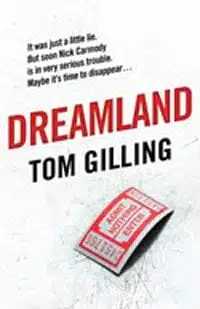
There’s an art in creating great meaning with little description. There’s a lot less in stringing together large amounts of description with little meaning. Dreamland, the third novel from Sydney writer Tom Gilling, is a case of the latter.
Gilling has a detective’s eye for details and Dreamland is full of them. No noun is admitted onto the page without an accompanying adjective. Characters are usually introduced with their full names and brief curriculum vitae. It just adds up to so little in the end.
Dreamland follows the genre conventions of a thriller, although it’s curiously low on thrills. The hero of the story, Nick Carmody, is a 29-year-old journalist. A public scandal has seen him banished from the high-octane crime desk to a life of re-writing stories from obscure American newspapers. His girlfriend has left him and he is apparently broken up by it. He’s not exactly down-and-out, but he’s not on the up-and-up.
Then an old school friend gets himself into trouble after a chemically-influenced New Year’s and Carmody is plunged into a dangerous world he doesn’t understand. Facing possible charges for a crime he didn’t commit, Carmody goes on the run.
All the thriller tropes and characters are present and correct in Dreamland: the troubled rich-kid, the shady millionaire property developer, the mysterious girl who doesn’t ask questions and is remarkably willing to sleep with the hero. The major departure from genre is that Carmody doesn’t make any serious attempt to uncover the truth of his case. That is a little bit baffling, because if any thriller character has a plausible chance of proving their innocence it’s surely a former crime journalist.
No, when Carmody runs, he just runs. He steals a car and drives cross-country, stopping off in a number of gratuitously-referenced country towns where absolutely nothing happens to him whatsoever. Settling in Melbourne he assumes another man’s identity and that is where he meets the previously-mentioned mysterious girl.
For a moment it looks as if he might find love and the reader might find some excitement. People from Carmody’s past return to threaten his new identity. There are missing guns and mysterious deaths. The shady millionaire property developer (is there another kind in thrillers?) has his fingerprints on everything. A big paranoiac conspiracy seems to be just pages away.
Then it all ends suddenly.
There are plenty of books that can pull this off successfully. Crime novels benefit from some residual mystery and too much exposition and finality will make an ending frankly anti-climactic.
Unresolved endings work for the reason that the sudden down-shift gives you a jolt. You can be left with unanswered questions to ponder for days after you return the book to the shelf. The writer has lured you into a narrative and you find yourself caring about the questions and the answers and the whole crazy trip. So when they cut you off suddenly, your stimulated imagination kicks in to take you the rest of the way.
This isn’t the case with Dreamland. The pacing is so unenthusiastic and the surprises so mundane and inconsequential that the reader doesn’t have the chance to get involved. In fact, all the possibly-connected, possibly-random events throughout Dreamland come out looking like lazy red herrings. Concepts and characters are introduced and forgotten a few chapters later. It seems pretty haphazard.
The characterisation doesn’t help much either. As with many of the dramatis personae of Dreamland, Carmody is little more than the sum of his upbringing, job, and hair colour. This could have been a meaningful statement about the loss of selfhood after he steals another man’s identity, but Carmody was boring long before he jacked someone else’s car.
His love interest, Alison, fares even worse. Despite initial hints of an independent personality and some feistiness, she soon settles into half-hearted couplings with Carmody that we are told constitute a love affair. There isn’t much in the book to give you that impression. Really, someone should start a union for mysterious women in thrillers and demand better conditions.
True, the women of classic film noir were often no more than screens on which men projected their fantasies and fears — but classics like Laura or Gilda were aware of that fact and played it up. Too many thrillers, book and film, are content to let their (male) heroes drift in and out of relationships with women they, and we, never really get to know. There’s no statement on Freudian psychology or gender politics — it’s just indifference. Without some strong signal to the contrary, it can only be assumed that Dreamland is indifferent.
Whatever his commitment to his characters, Gilling has a clear love for his city. Sydney’s glittery nightlife and seedy underbelly are treated with a kind of relish that disappears the moment Carmody departs. It might have been better had Gilling kept his characters in the gritty milieu he so enjoys.
With a sluggish plot and a lack of deep metaphorical significance, Dreamland is a disappointment.
